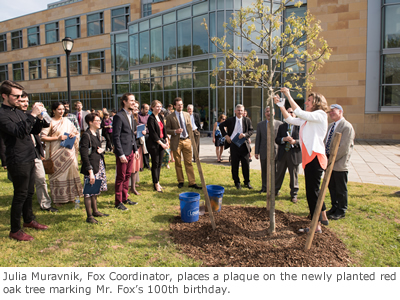A Celebrated Life: Joseph C. Fox
 On May 12, the MacMillan Center hosted a celebration of Joseph C. Fox’s life with a tree planting on its grounds in honor of his centennial birthday. Mr. Fox (Yale ’38) is the founder of the Fox International Fellowship at Yale. The event was attended by Mr. Fox, his wife, Alison Barbour Fox, his children, Yale President Peter Salovey, MacMillan Center Director Ian Shapiro, Fox Director Benjamin Cashore, Fox Coordinator Julia Muravnik, the Fox International Fellows at Yale, and other students and staff at the MacMillan Center.
On May 12, the MacMillan Center hosted a celebration of Joseph C. Fox’s life with a tree planting on its grounds in honor of his centennial birthday. Mr. Fox (Yale ’38) is the founder of the Fox International Fellowship at Yale. The event was attended by Mr. Fox, his wife, Alison Barbour Fox, his children, Yale President Peter Salovey, MacMillan Center Director Ian Shapiro, Fox Director Benjamin Cashore, Fox Coordinator Julia Muravnik, the Fox International Fellows at Yale, and other students and staff at the MacMillan Center.
Around the mid-1980s, Joe’s lifelong fascination with the international community, combined with the political realities of the Cold War’s impending end, led him to recognize the importance of building bridges between East and West, particularly between the United States and the Soviet Union. After a couple of years exploring various models, he settled on the idea of a student exchange program between Yale and Moscow State University. He named the prospective program the Fox International Fellowship.
The Fellowship extended its reach in 1994 to England, when Sidney Sussex College at the University of Cambridge agreed to join the exchange. Two decades of expansion followed, and by 2014 the Fellowship offered mutual exchange opportunities to thirteen countries: Russia, the United Kingdom, France, Mexico, India, South Africa, Japan, Germany, China, Turkey, Israel, Ghana, and Brazil. In 2015, the Fox
 Fellowship announced partnerships with universities in Singapore, Canada, Australia, and Denmark.
Fellowship announced partnerships with universities in Singapore, Canada, Australia, and Denmark.
Today, the goal of the Fox International Fellowship is to enhance mutual understanding among the peoples of the United States and other countries by enabling international scholarly exchanges and collaborations among the next generation of leaders. The Fox Fellows engage in research that connects to practical problems facing our world. To that end, the program convenes workshops and conferences within Yale and at partner institutions on pressing issues, such as security, climate change, and corruption. These workshops contextualize the research being done by the Fellows and ground their work in the real world.